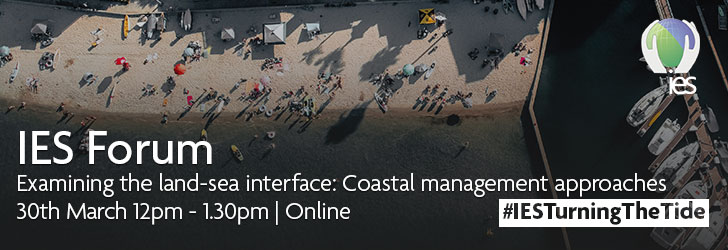The ways in which coastal zones are managed play a key role in the wider picture of ocean sustainability.
In this Forum, we will hear from speakers with expertise in various coastal management approaches who will be sharing insights on best practice and overcoming challenges in implementation, followed by a Q&A session:
- Collaborative working to support coastal local authorities and their communities
Beccy MacDonald-Lofts, Lead Officer at LGA Coastal SIG, UKThe communities of our coasts are complex, facing many different challenges and opportunities that are not only unique to the coast but also differ from one area to another. This complexity often pushes the coast to the periphery of infrastructure, levelling up and financial support. The LGA Coastal SIG strives to make our coastal communities viable and resilient, now and into the future, and recognises that for this to happen we need to work collaboratively, using partnership approaches to raise the awareness of the challenges faced by these unique communities and drive change. Through our work with the OneCoast Coalition, co-Secretariat role with the All Party Parliamentary Group for Coastal Communities, and partnership working with other organisations including the Coastal Group Network, Coastal Partnership Network, Environment Agency, MMO and Defra, we believe that change can happen.
- An introduction to Integrated Coastal Zone Management
John Turner, Professor of Marine Biology and Head of School of Ocean Sciences at Bangor University, UKIn this talk John will give an overview of Integrated Coastal Zone Management (ICZM) as a tool and process, sharing details of how it works and the usefulness of data to end users. He will cover two short case studies: the Rodrigues octopus fishery and a strategy for the conservation and sustainable use of marine biological resources in the Socotra Archipelago. John will discuss the key aspects of Coastal Strategy Planning, and share details on why ICZM may fail.
This event is being organised as part of our Turning the Tide: systems thinking for a sustainable ocean project. Join our dedicated mailing list to stay up to date on future project activities and hear about ways to collaborate.
Our speakers

Beccy MacDonald-Lofts is the Lead Officer at The Local Government Association Coastal Special Interest Group (LGA Coastal SIG). LGA Coastal SIG has a membership of 57 coastal councils, covering ~60% of England’s coastline and serving 16 million people. They champion for the collective interests of coastal communities by increasing awareness and debate on environmental, economic and social issues at all levels in relation to the coast. Beccy MacDonald-Lofts is responsible for delivering LGA Coastal SIG's core values. Beccy specialises in the marine and coastal landscape, as both an educator and conservationist, having developed a career focusing on connecting people and place to the benefit of both.
Contact: lgacoastalsig@southtyneside.gov.uk | Twitter: @LGACoastalSIG @BeccyMacD

Professor John Turner is Professor of Marine Biology and Head of School of Ocean Sciences at Bangor University, UK. John was Course Director of the MSc in Marine Environmental Protection at Bangor University for 22 years between 1989 and 2011 and held a Visiting Lectureship at the University of Mauritius in Marine Environmental Science in the mid 1990s. He developed research interests in mapping coral reef biotopes, Environmental Impact Assessment, Marine Protected Areas and Coastal Zone Management. John became Dean of Postgraduate Research, heading the Doctoral School in November 2016, and was appointed Head of the School of Ocean Sciences in November 2018.
Most of his research has developed in partnership with end users (e.g. British Indian Ocean Territory Government Section of Foreign and Commonwealth Office; Cayman Islands Government; Seychelles Island Foundation; The Nature Conservancy, USA). Recently, his research has focussed on coral reefs of the UK Overseas Territories, and his research strategy is driven by the need to protect marine environments largely through the establishment and monitoring of Marine Protected Areas, or use of tools such as Environmental Impact Assessment and Coastal Zone Management, often to comply with the major conventions (e.g. Convention on Biological Diversity CBD, Convention on Migratory Species CMS, Convention on Trade in Endangered Species CITES, RAMSAR Convention on wetlands, and EU Habitats Directive). His projects are generally established through links with leading scientists with complementary interests and through liaison with stakeholder organisations, and are implemented through practical research overseas involving scientific diving operations, training, stakeholder consultations and outreach initiatives. John is a member of the DEFRA Darwin Initiative panel of the Darwin Plus Advisory Group for the British Overseas Territories, Member of NERC College and Trustee of the Chagos Conservation Trust, and a Trustee of the SeaWatch Foundation.


